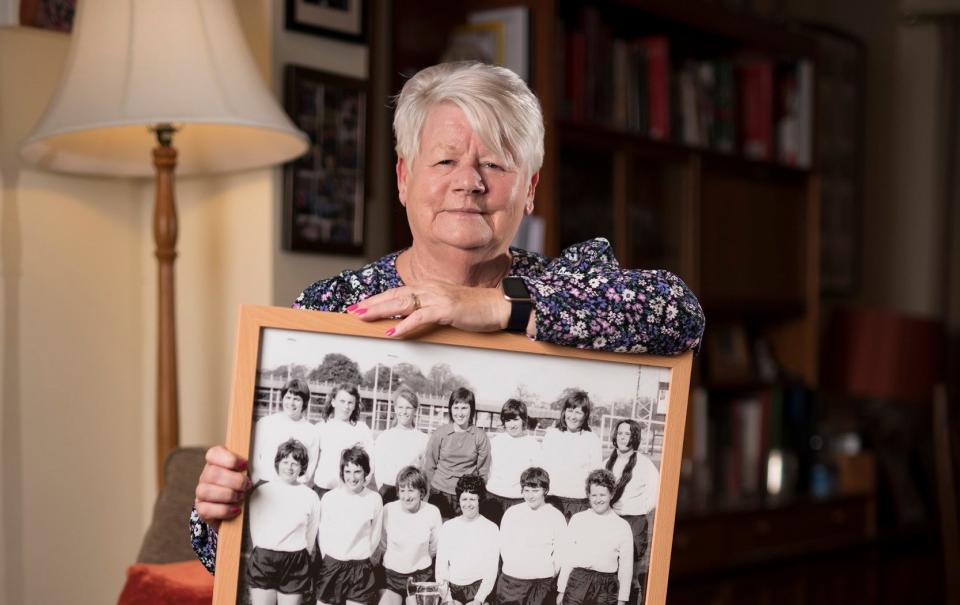Fran Kirby and Lesley Lloyd, first Women's FA Cup-winning captain, recall 50 years of the famous trophy

The overcast afternoon of Sunday, May 9, 1971, began in low-key fashion for Lesley Lloyd, as she sat and ate her cheese-and-pickle sandwiches on the banks of the Crystal Palace National Sports Centre. A few hours later, she would make history as the first captain to hold aloft the Women’s FA Cup.
Lloyd and her team-mates were so early for that inaugural final that they went for a coffee - and they were also alarmed by the length of the grass. “It was like playing in a jungle, the grass hadn't been cut,” she recalls. That certainly didn’t thwart Southampton, as they ran out 4-1 winners against Scottish side Stewarton Thistle, but there were no official photographers present to capture the historic moment when Lloyd was handed the cup.
On Sunday, Lloyd will be at Wembley with her family to watch the 2021 final between Arsenal and Chelsea, which will be broadcast to millions live on BBC One. Southampton’s triumph 50 years ago had a small mention on that evening’s BBC news, with the score being read out, but Lloyd recalls: “You couldn't find it in the national newspapers the next day. One men's football magazine called Goal did include some coverage the next week. Everyone forgot to take a picture of us holding the cup, so we were phoned up the next week and asked to get together again for a photo.”
This week, by comparison, Lloyd smiles as she describes her “mad” schedule of media interviews. The latest of those, exclusively for Telegraph Sport, saw her joined in conversation by Chelsea and England forward Fran Kirby, who is eager to see Lloyd’s medal. As Lloyd proudly holds up a brightly-polished small trophy, she explains that on the day every player received a small replica of the main cup itself, the original "WFA Mitre Challenge Cup" - which is, in fact, still missing - but Lloyd will never forget lifting it into the air.


“It was brilliant getting the trophy. [Former FA secretary] Denis Follows' wife Betty handed it to me. She had a huge hat, it looked like she was going to Ascot and I got a bit overwhelmed because we were all muddy."
Lloyd says Kirby reminds her of Southampton's Pat Davies, who scored a hat-trick in 1971's final, adding: "She was quite small, very quick and very tricky. She had very good footwork and was always in the right place at the right time, and we had Sue Lopez, a legend. So we had stars, too. You’re far more skilful than we were, and you’ve got fitness coaches, nutritionists and physios, but one thing we had was the same competitive nature. In 50 years, that doesn’t change.”
Kirby fully appreciates the significance of this year’s cup final date, which has been timed to coincide with the centenary of the FA banning women’s football on December 5, 1921. Lloyd’s first final in 1971 was a landmark moment in that women were allowed to play on an affiliated ground, which had not been allowed for 50 years, and Kirby says: “Every person who has worked in women’s football should be so proud. I feel that we often get caught up in the ‘now’ and how amazing it is, instead of championing the ones who have brought the game to where it is. We must not forget about the people who helped build this, who fought for us to be able to play.”
Lloyd says she "never dreamt it would come as far as it has" but there's one thing she really wants to know from Kirby - will she have a night out if Chelsea win on Sunday? "We were supposed to but, now, with Covid, it’s a bit more difficult. I think we’re getting the coach back to Cobham and then going home. Hopefully when it’s safe again we can do something," Kirby said. Lloyd's celebrations in 1971 were similarly subdued, but for very different reasons, as she recalls: "We got in our cars and drove home. We didn’t have the money, it was hard, we had to pay our expenses. But winning is enough, nobody can take winning away from you."
The fully-professional status of the top women's sides today means Kirby and her team-mates certainly aren't paying for their own petrol to drive to Wembley, as the 28-year-old outlines: "We’re looked after extremely well. We’ll go to the hotel the night before, and then we’ll have breakfast pre-match, all designed for your specific needs to fuel for the game. You can get really wrapped up in the occasion so you have to stay as calm as possible. We’ll probably have a couple of PowerPoint team meetings, and then some nutritional things, energy gels." It's a far cry from Lloyd's pre-match cheese-and-pickle sandwiches.
But they both know there is more progress to be made. Asked where she'd like the game to be in 50 more years, Kirby says: "It would be the women’s having the same facilities, the same level of care that the men’s players receive. The stadiums, the pitches, these are the things we want to fight for." Lloyd is confident that will happen, adding: "We will get it right. We’ve got good foundations now and it can only progress. The skill that’s been reached by women playing nowadays is massive."
Kirby has one last important question for Lloyd: "Who are you supporting on Sunday?" Southampton fan Lloyd looks slightly hesitant as she politely explains that her son-in-law and grand-daughter are Arsenal supporters, but adds: "It's going to be a showpiece. I think you’re going to win. Chelsea are probably the favourites. I just want to see a good game, so that it enhances women's football."
Hopes are indeed high for a thrilling final, with the current top two sides in the league going head-to-head in the final for the first time since the fixture started being staged at Wembley in 2015. Record 14-time cup winners Arsenal are one point better off in the league table than Chelsea, who emphatically knocked out the cup holders, Manchester City, with a 3-0 away semi-final win, while Arsenal beat Brighton by the same scoreline to proceed.
The fixture could also set a new record for a Women's FA Cup final attendance, with sources saying more than 47,500 tickets have been sold. That should see the crowd eclipse the competition-record 45,423 who saw Chelsea beat Arsenal 3-1 - including a goal from Kirby - in 2018's final.
The women who played on when women's football was banned
By Tom Garry
It was June 1921, and in the West Yorkshire market town of Hebden Bridge the local men’s football team were debating whether they should set up a women’s side. The club were merely a grassroots Sunday league outfit, yet such was the excitement around the women’s game at that time as the legendary Dick, Kerr Ladies attracted crowds in excess of 50,000, there was a genuine appetite from ordinary women wanting to play.
But that growing interest was a worry for the Football Association. Just five months later, on December 5, women were banned from playing football, a sport deemed “unsuitable for ladies.” A century on from that game-changing moment, the timing of Sunday's Women’s FA Cup final at Wembley serves as some acknowledgement of the sport's disadvantageous history.
However, a common misconception was that this damaging ban was enforced across the whole of the United Kingdom - this was not the case, as four academics are determined to prove. Their new research shows that the Scottish Football Association did not introduce a formal ban until September 1949, with Scottish women facing more of an informal ban in those intervening years, which a brave few valiantly defied.
“There’s a general consensus that women didn’t play football after the First World War,” says Dr Fiona Skillen of Glasgow Caledonian University, “but I’ve researched Rutherglen Ladies FC and their matches shatter the established narrative in Scotland.” Rutherglen, from South Lanarkshire, were so strong they even had their own B-team, and they played across the nation before successfully touring Ireland in 1927.
“Suddenly there’s a team that was playing regularly, that nobody knew anything about 18 months ago. This research has shone a light on those women and those experiences.”
Even among the nations who did follow the English FA’s lead in adopting the ban – such as Wales, who brought in similar legislation slightly later in March 1922 – there was a defiance from women to play on. Until then, Wales had enjoyed an explosion of women’s teams, new digitised newspaper archives show, with the South Wales Women's Munitions League attracting swathes of teams from Newport to Llanelli. The ban seemingly forced a sharp halt to proceedings, but historian John Carrier has uncovered the little known endeavours of Barry Town Ladies - formed in the 1940s by the mayoress of Barry, who had other ideas.
On July 24, 1948, they planned to stage a game at the town's Jenner Park Stadium, but the FWA's general secretary Herbert Powell stepped in and stopped them using an affiliated pitch, so they played at Barry's more meagre Maslin Park venue instead, losing 13-0 to well-established visitors Bolton Ladies, whom they would meet on further occasions as well as playing games against Manchester Corinthians in front of 3-5,000 supporters. “[Eventually], they had to disband," Carrier said. "If that ban had never happened, where would we be? Women’s football would be in a much more significant place.”
In Ireland, the history of the ban is intertwined with the political divisions of the time, and the resulting societal changes. “The constitution for the new Republic, formed in the 30s, firmly placed a woman’s place in the home, and there was legislation implemented before that to restrict women’s ability to enter the workplace,” says librarian and researcher Helena Byrne. “So you have a long period of women not being in work, which is where most teams were established.”
Scottish side Rutherglen's 1927 tour to Ireland, which included at least eight matches, is said to have drawn in large crowds and helped raised the profile of charismatic and trailblazing Irish player Molly Seaton [1905-1974] from Belfast, who was reportedly a tough-tackling defender with great stamina who loved Guinness and would go on to score twice for an 'Ireland' team in a 3-2 loss to Dick, Kerr Ladies in 1931.
Yet still, official historical texts charting the efforts of Seaton and other pioneers of the women's game remain few and far between, as Skillen adds: “We’re all hoping that, by doing this work, we’re going to motivate other researchers to come and look and question some of the myths that have been established, and celebrate women that have often been forgotten or hidden from history.”
And time is of the essence, as many of the women who defied the respective FA’s stances to play football in the 50s and 60s grow older, Byrne issues an impassioned plea: “A lot of the administrators and players have passed on. We’ve lost people along the way. There needs to be a national project to document this wonderful history and it is time-sensitive, so the funding needs to come soon for a big wide scale project. What we’re doing is great but it’s only scratching the surface.”
A new exhibition at the Scottish Football Museum celebrating Rutherglen Ladies DC opened on Friday for six months. Further details can be found here.

 Yahoo Sport
Yahoo Sport 




































